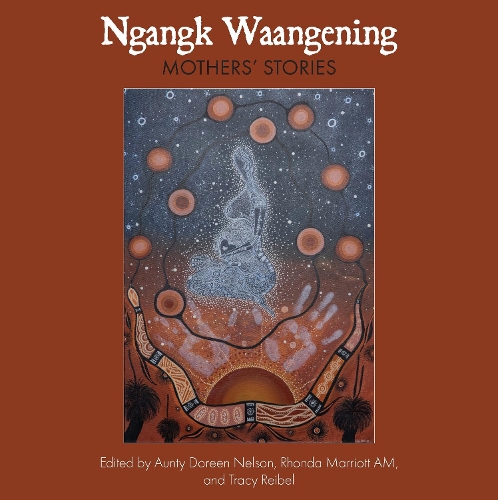
Ngangk Waangening: Mothers' Stories
(Paperback)
Publishing Details
Ngangk Waangening: Mothers' Stories
By (Author) Aunty Doreen Nelson
By (author) Rhonda Marriott AM
By (author) Tracey Reibel
Fremantle Press
Fremantle Press
12th August 2021
Australia
Classifications
General
Non Fiction
Health economics
Essays
Anthologies
Physical Properties
Paperback
104
Width 216mm, Height 215mm, Spine 8mm
401g
Description
This is a unique book of Noongar and Yamatji mothers' accounts of their birthing experiences, highlighting the importance of developing respectful, thoughtful, woman-centred care for Aboriginal women and their families. In Ngangk Waangening, a group of Elder and Senior women generously share their birthing stories as a legacy for their families and communities, and as an educational tool for midwives and young mothers who may not have access to traditional support systems while giving birth to their babies.
Author Bio
Aunty Doreen Nelson (Author) Aunty Doreen Nelson is a Noongar woman, born on Balladong Country in the Wheatbelt area of Western Australia. Her family are the Jettas, the Yarrans and the Michaels, and she has lived for most of her life in the country but moved down to Perth in the last 30 years. Rhonda Marriott AM (Author) Rhonda Marriott was born in Derby, WA, and is a descendant of Kimberley Nyikina Aboriginal people and has devoted her adult life to nursing and midwifery in both clinical and academic roles. Much of Ngangk Yira's ethos is based on her experience over five decades, and almost three decades as an academic. In 2003, she became the inaugural Head of Ngangk Yira's School of Nursing. In additon to leading Ngangk Yira's research projects, Rhonda is a chief investigator for several NHMRC projects. Tracey Reibel (Author) Tracy Reibel is a passionate advocate for the routine provision of woman-centred care in maternity health systems, with over 25 years experience conducting research into maternal and infant health. In her role at Ngangk Yira, Tracy collaborates with a national network of colleagues, undertaking programs of work aimed at strengthening maternity care systems so these are culturally safe and meet Aboriginal women's cultural and personal needs.
